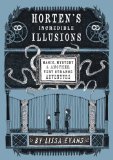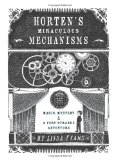 Doll Bones
Doll Bones
by Holly Black
Margaret K. McElderry Books, 2013. 244 pages.
Starred Review
Wow! Holly Black has surpassed herself with Doll Bones. It’s a kids-going-on-an-adventure novel, a ghost story, a growing-up tale, a story of friendships changing, and a story of coming to terms with parental expectation. And it’s all carried out beautifully.
Zach and his friends Alice and Poppy have an incredibly detailed imaginative world going. In a episode that reminded me of the ship scene in Momo, Zach leads his action figure William the Blade on a pirate ship adventure, attacked by Poppy’s mermaids and assisted by Alice’s Lady Jaye.
But Zach is twelve years old, and it’s not only other kids who think he’s too old to play with action figures. When Zach comes home from basketball practice, his Dad has thrown all of them away, saying it’s time for Zach to grow up. Zach doesn’t want to tell the girls.
That anger curdled inside his belly and crawled up his throat until it felt like it might choke him. Until he was sure that there was no way he could ever tell anyone what had happened without all of his anger spilling out and engulfing everything.
And the only way not to tell anyone was to end the game.
Not surprisingly, the girls don’t take kindly to that. Poppy tries to entice Zach back into the game by taking the creepy doll her mother owns, the doll they call The Queen, out of its glass cabinet. But when she does so, that night she has a vivid dream.
“It wasn’t like a regular dream,” Poppy said, her fingers smoothing back the Queen’s curls and her voice changing, going soft and chill as the night air…. “It wasn’t like dreaming at all. She was sitting on the end of my bed. Her hair was blond, like the doll’s, but it was tangled and dirty. She was wearing a nightdress smeared with mud. She told me I had to bury her. She said she couldn’t rest until her bones were in her own grave, and if I didn’t help her, she would make me sorry.”…
“Her bones?” he finally echoed.
“Did you know that bone china has real bones in it?” Poppy said, tapping a porcelain cheek. “Her clay was made from human bones. Little-girl bones. That hair threaded through the scalp is the little girl’s hair. And the body of the doll is filled with her leftover ashes….
“Each night she told me a little more of her story.” Illuminated by the flashlight, Poppy’s face had become strange. “She’s not going to rest until we bury her. And she’s not going to let us rest either. She promised to make us miserable unless we help her.”
So the three kids set out. Zach and Alice aren’t sure Poppy’s not making it up, until more strange things happen. Their plan is to take a bus to the gravesite up the river in East Liverpool, Ohio. But a crazy man on the bus spooks them, and they get off the bus too soon, and then must escape the attention of officials.
I’ve said in other reviews that I don’t normally enjoy creepy stories. But this one is done beautifully. I should say that there’s a lot more scary dread than anything that actually happens to the kids. But I think it’s fair. The doll gets upset when they get sidetracked from their mission, but she has no reason to be upset as they near the goal.
Readers also might fault it for how nicely all the emotional threads tie up in the end. But I loved it. The different emotional threads are woven into the story with a delicate touch, and even though they tie up nicely, it never feels too good to be true.
This book is excellent on so many levels. The friendship between the kids changing on the cusp of adolescence feels real, with all the touchiness inherent in those changes. The quest is in the classic tradition of The Mixed-Up Files of Mrs. Basil E. Frankweiler. The kids aren’t well-prepared, and they argue along the way, but they follow their quest to a tremendously satisfying conclusion.
blackholly.com
KIDS.SimonandSchuster.com
Buy from Amazon.com
Find this review on Sonderbooks at: www.sonderbooks.com/Childrens_Fiction/doll_bones.html
Disclosure: I am an Amazon Affiliate, and will earn a small percentage if you order a book on Amazon after clicking through from my site.
Source: This review is based on a library book from Fairfax County Public Library.
Disclaimer: I am a professional librarian, but I maintain my website and blogs on my own time. The views expressed are solely my own, and in no way represent the official views of my employer or of any committee or group of which I am part.
Please use the comments if you’ve read the book and want to discuss spoilers!









